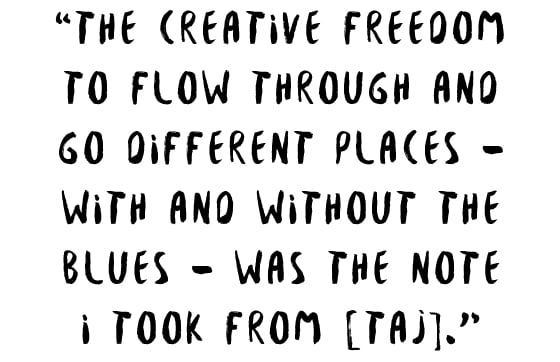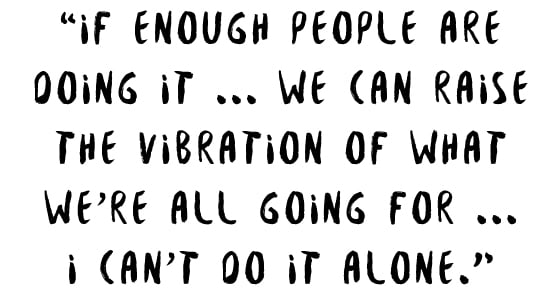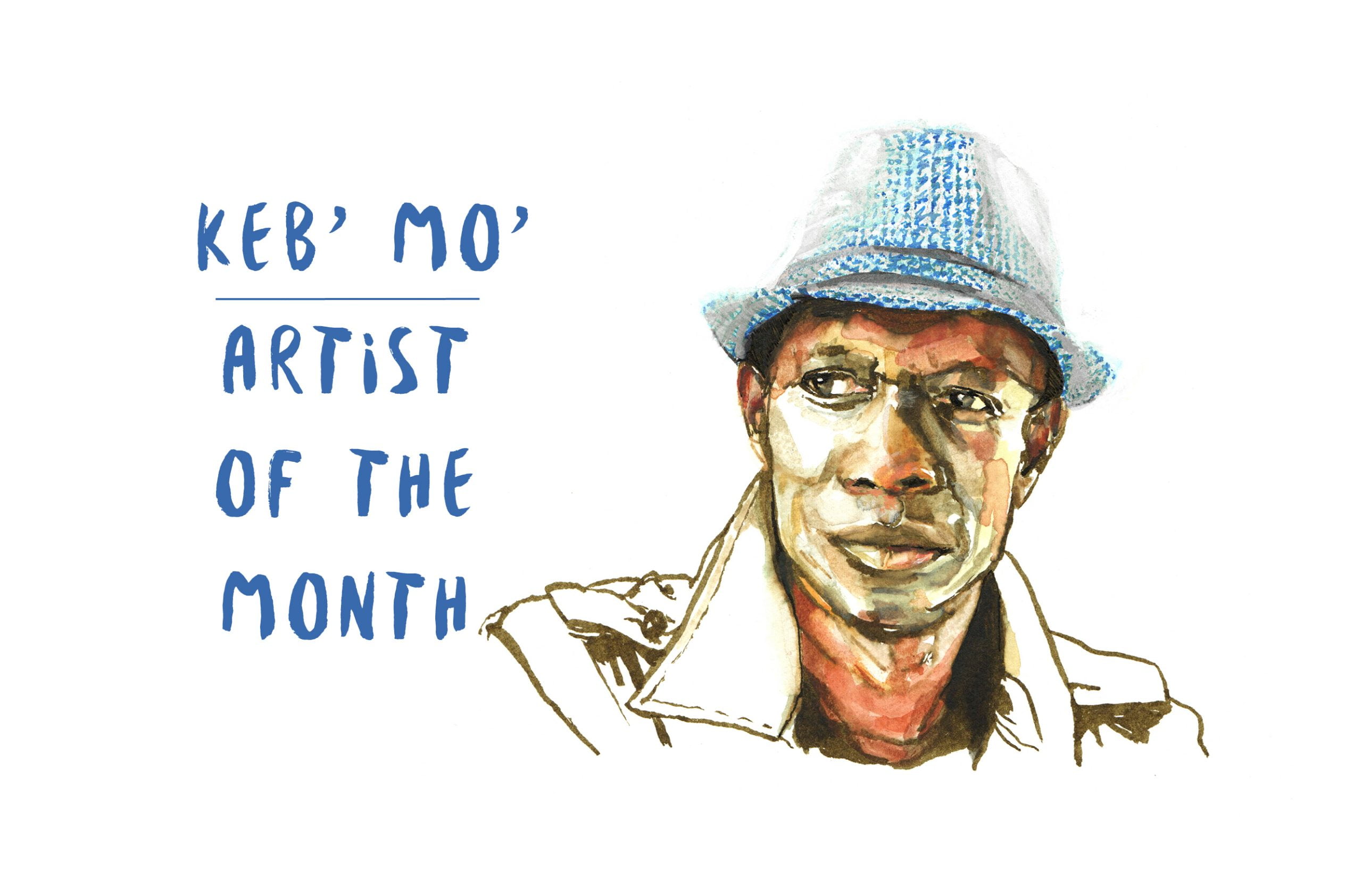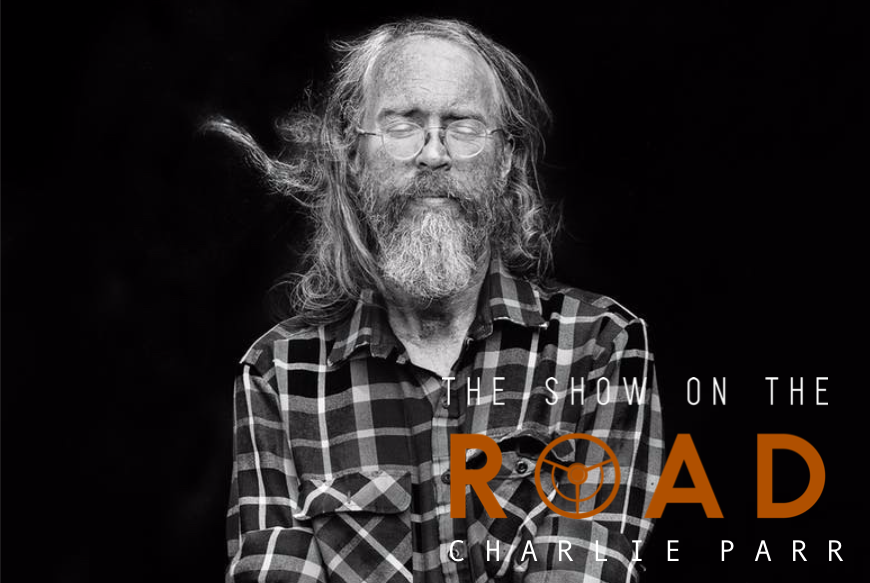Sometimes the future makes itself known in curious ways. Without the overarching scope of a narrative viewed from “The End” or the prescient understanding usually ascribed to mystics, however, it’s often hard to see in the moment. Comprehension follows chronologically. For Keb’ Mo’, scanning his life from the vantage point of the present, one such instance occurred during a Compton High School assembly in 1969. “When I was a kid in high school, I saw Taj Mahal,” he says. “He came and played. He didn’t talk to me. He didn’t even know I was there, but he showed up and played, and something happened.” Keb’ may not have known it at the time, but he got a glimpse of what lay ahead for him. “What I’ve learned over the years is that my work paid off to be in the presence of Taj Mahal and be in the game.”
He ascribes that early experience — hearing a musician on his way to becoming a legend — with helping him discover the value of showing up, of giving others your time and even sometimes simply your presence. (It’s a torch he’s carried by supporting a variety of music education programs, such as Playing for Change.) But beyond the importance of that philanthropic foundation, he came face-to-face (or perhaps more like ear-to-ear) with the musician he would one day play with, first on stage and now in the studio. “I’ve had moments on stage with him over the years, but we’re going in deep now,” Keb’ laughs.
He and Taj have partnered to release TajMo, a collection of covers and originals that take the blues as a starting point and move out, likes waves, to the other genres such waters touch. Classics like Sleepy John Estes’ “Diving Duck Blues” sit alongside John Mayer’s folksy-blues “Waiting on the World to Change” (replete with vocals from Bonnie Raitt) and the Who’s boisterous “Squeeze Box.” It’s a smorgasbord, as if Keb’ and Taj were hungry for all sorts of sounds and refused to curtail their diet. “The creative freedom to flow through and go different places — with and without the blues — was the note I took from him,” Keb’ says, summarizing what he learned. “That it’s okay to go. With this record, we knew we were going to do some breezy stuff, but it was also okay to go.”

Going places has long been Taj’s M.O. The prolific musician may have his foot firmly in blues, but he’s often wandered free from those constraints in order to find equally compelling cultural intersections. So, too, has Keb’. Known especially for his guitar playing — loosely relaxed yet robustly impassioned — he actively participated in Compton’s numerous music scenes, each of which added a component to his making. Where Taj wandered geographically, Taj wandered instrumentally. “I played French horn and I was the percussionist for the jazz band,” he says. “Everything was there for us to thrive and to become.”
It’s clear now how becoming, for Keb’, was always going to be a matter of finding the sounds first. It’s an inclination that remains with him to this day. When words don’t fully encompass what he’s feeling — if he isn’t entirely sure how to articulate a thought — he plucks his electric guitar. Such moments are quick, mere flashes in the pan that can be easily missed or mistaken for background noise, especially over the phone, but it happens often enough to see how a quiet A7 loosens the words necessary to make sense of the world.
The patience he brings to conversation can be seen in his work, as well. It’s a quality that helped him when it came to recording TajMo. The album took years. He recalls recording “Om Sweet Om” with friends during a party on New Year’s Day in 2015. “It was just magical,” he says about that session. “That album took a long time because we were tedious, and we were never in the same place at the same time for a lot of time. That gave me a lot of time to keep going in and listening to it, to really massage it. It gave me great perspective.” The two would exchange songs, deciding which to include, before Keb’ recorded them and sent them back. Then they’d get together to record the vocals, harmonies, and guitar overdubs.
The entire endeavor began with “Diving Duck Blues,” a song Mahal has covered often, both as a solo artist (including on his 1968 self-titled debut album) and with an array of musicians. “We did Crossroads [Guitar Festival] in 2012 at Madison Square Garden. Taj and I just sat down and did a version of ‘Diving Duck Blues’ and it made it onto YouTube.” When it came time to work on an album together, Keb’s wife knew exactly what they needed to do. “My wife, she said, ‘You gotta do ‘Diving Duck Blues’ on the record.’ She’s smart. So we went into the studio and recorded a version of that.” The version they came up with airs on the lighter side of the song’s despondent chorus. Thanks to a more relaxed and at times meandering rhythm, the two men edge away from bleak to find fresh perspective. Considering that the version Mahal included on his self-titled debut album falls closer to a feeling of prickly, wounded pride, their latest effort together suggests more than a touch of truth to that adage about wisdom blossoming with age.

The lengthy amount of time both musicians invested in TajMo, while working on other projects and touring independently, also meant that the world shifted around them as they neared release. “When we started making the record, all this stuff wasn’t going on,” Keb’ says about partisan politics and the country’s divisiveness. “And so to all of a sudden look at now and go, ‘Whoa,’ I’m so glad we finished it because in two months we’d be dead already.” A laugh follows his momentary apocalyptic thought. “I’m not happy about having Trump as president, but at least, if that was inevitable, then we got in some kind of divine flow to have a piece of art that can shed some light on a dark situation.” Mahal echoed that very sentiment when discussing his own music, “It gets me through all of this,” he says about music. “That’s why people like what I do, because it gets them through it.”
Where Taj is more likely to dive into a deep conversation about politics, race, and the state of things, Keb’ refrains from going too deep. Not because he doesn’t have opinions, but because he sees the benefit of approaching things from a different perspective. “Rather than speak out against an individual, I would rather speak out against divisiveness and spread more positive energy out there,” he says. That impetus explains why Keb’ and Taj decided to cover Mayer’s call for peace, “Waiting on the World to Change.” The song falls in line with other positive messages included on the album, such as “All Around the World” and “Soul.” It’s an idea that more and more R&B artists have been striving to include in their new releases, including Lee Fields and Aaron Neville: Take care of each other; take care of the world. Listening to “Soul,” it’s hard not to get swept up by the vision Keb’ and Taj put forth, listing off country after country to illustrate the soul connecting every living creature.
Rather than add to the country’s divisiveness, Keb’ wants his music to stimulate positivity. Get enough people in a room — like an audience — and he reckons music can shift anyone’s attitude. “It’s got to come from telling a bigger truth that’s sincere in your heart, that’s going to resonate,” he says. “If enough people are doing it — artists of all types, newscasters of all types, journalists of all types — we can raise the vibration of what we’re all going for.” But the work can’t come from any one person. What he and Taj have created and put out into the world is only one part of the larger need. “I can’t do it alone,” he admits, pointing back to TajMo. “That’s just a small piece in the overall narrative.”
Lede illustration by Cat Ferraz.



